SEO involves a wide range of tasks, from keyword research, on-page optimization, and link building to technical SEO audits, competitor analysis, and performance tracking.
Performing these tasks manually can be time-consuming and prone to errors, especially for larger websites or complex SEO campaigns. This is where SEO automation tools come in.
As you put in more effort into SEO, adopting a few automation tools can improve your efficiency and overall performance at SEO tasks. These software applications are designed to streamline and automate various aspects of the search engine optimization process.
Here are 13 of the best SEO automation tools for your website.
1. Surfer
Surfer has a bunch of automated SEO tools for the entire SEO workflow. They can help automate SEO tasks from keyword ideation and topic research to content generation and optimization.
Automating keyword research
Finding keywords to write about can be a time consuming process. Surfer's Keyword Research Tool can help you automate keyword research by just entering the main keyword you want to target.
First, identify a broad seed level keyword that you want to cover on your site.
Then head to Surfer Keyword Research and follow these steps.
- Enter your target keyword and country
- Click Create Keyword Research
Surfer will generate a lit of relevant keywords for your main topic. In this example, I used "film studies" as my main keyword to generate 43 related keywords in a couple of seconds.

Unlike other SEO automation tools that will give you a bunch of keywords, Surfer's Keyword Research only generates topics that are relevant for your website.
Finding new topic ideas with AI
You can also find new topics to increase the breadth of your blog's content using this tool. For example, I know that film studies can also cover acting, cinematography and film lighting.
Entering "cinematography" into Surfer Keyword Research gives me 99 more keywords to write on.

But just finding keywords isn't quite enough. You'll also want to cluster these into subtopics in a bid to establish topical authority for your blog.
Generating topic clusters
You may have already noticed, but Surfer goes a step ahead when generating keywords. It displays related keywords together in keyword clusters so you're not duplicating content and can address a subtopic properly.
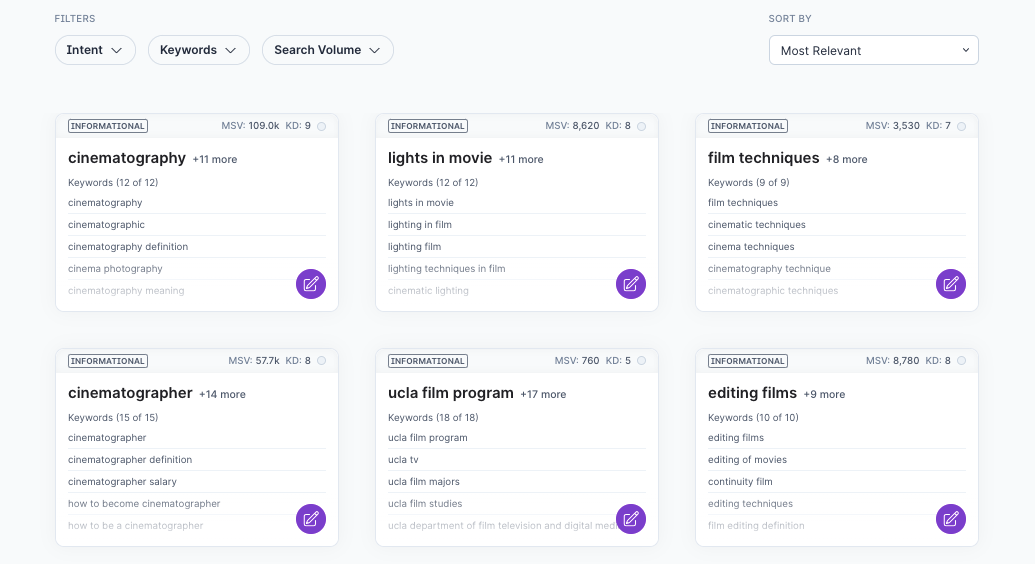
Clicking on any of these keyword cluster tiles will help you see more SERP information that can help you make a decision.
The relative keyword difficulty metric is personalized for your website so will range between hard, medium and easy based on how your domain is perceived by search engines.
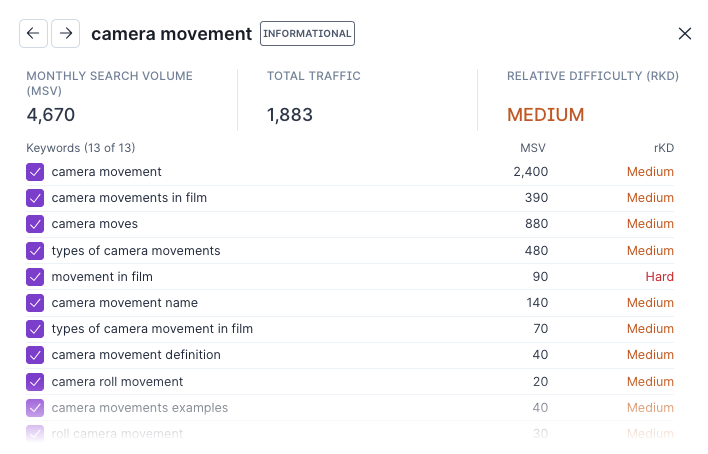
Not having to individually compile keyword search volume and traffic potential can free up your efforts and focus towards your online marketing strategy.
Notice that Surfer will also automatically label the keyword with its correct search intent. In the example above, the user intent has been categorized as "informational."
Automating article outlines
You can also ask Surfer to provide you with an automated outline for your blog post.
Head to Surfer Content Editor and follow these steps.
- Enter your main keywords
- Select your country and device preferences
- Click Create Content Editor
You'll then be offered the option to generate an outline inside the editor's panel.

You can also visit Surfer's free Outline Generator to create headers for your blog posts.
Using AI to optimize keywords
Now you have automated keyword research and topic clusters, Surfer can also help you with keyword insertion.
When writing an article for a target keyword, you'll want to include secondary keywords and variations to signal topical depth to search engines.
Instead of manually guessing how many times you should include a keyword and its variations, you can use Surfer's Content Editor.
Just enter your target keyword as a query in CE and you'll find a list of suggested terms inside the editor.
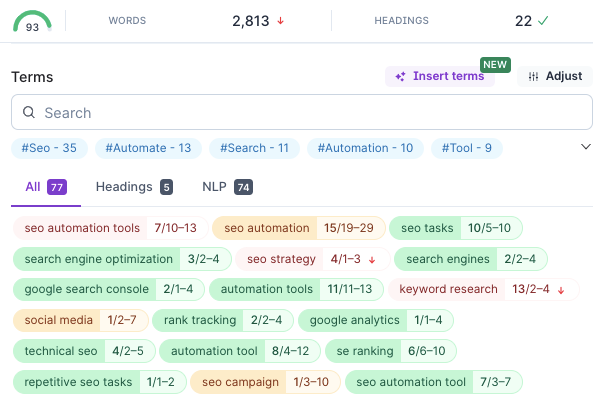
Those highlighted in green are within the optimum frequency while the others need improvement. The suggested range of use are the numbers beside the keywords.
The tool will also automate routine SEO tasks like your word length and the use of headings and images.
Automating content writing
Automated SEO tasks like keyword research can help you save a ton of time and effort. But we know that articles take the most time and attention.
Surfer AI can help you automate the creation of fully optimized content for your target keyword.
Just go to Surfer Content Editor and ensure that you select the Write with AI tab to start writing AI generated articles.
- Enter between 1-5 primary keywords
- Select your country and device preferences
- Click the Create button
Inside the editor, select the Generate an article button and follow the steps.
Surfer AI will take into account your choice of tone and competitors before generating a complete article for your target query.
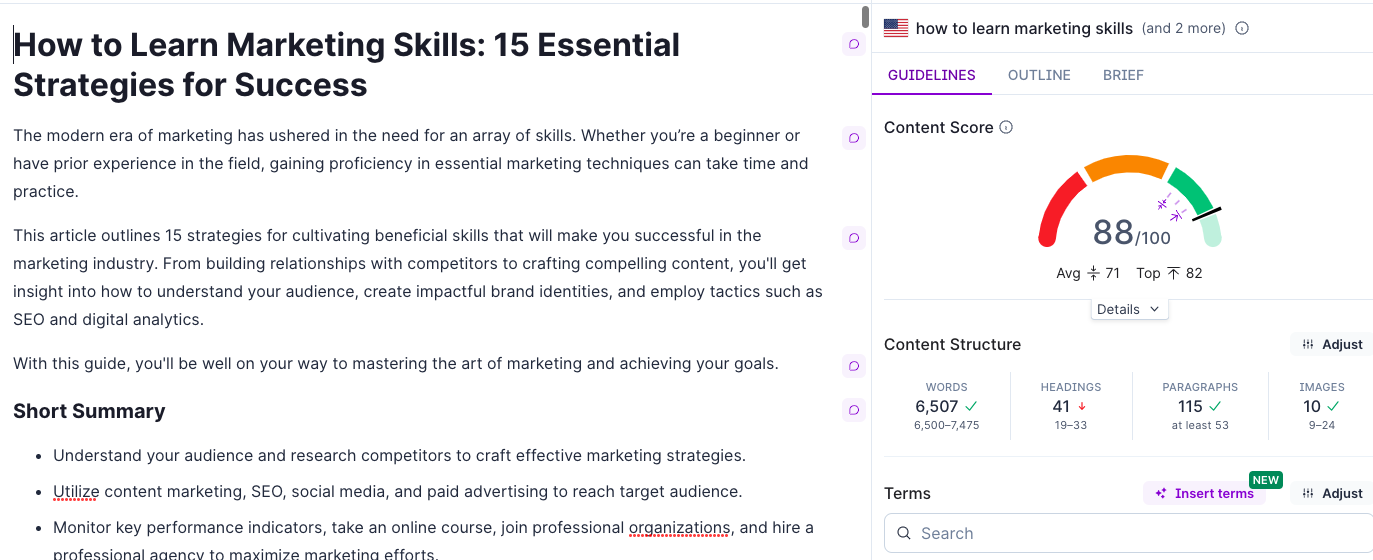
Unlike other content automation tools, Surfer AI creates content that is based on other top ranking pages for your target query. It also automates keyword insertion so you don't have to spend time doing it manually.
With the bulk of your content creation now automated, you can review the article and edit it before publishing.
Auditing pages for opportunities
Surfer Audit can help you analyze page URLs to find areas of improvement.
It can automate the task of looking up specific pages and checking their keyword usage, metadata, NLP optimzation and keyword density among several other elements.
To audit a page, head to Surfer Audit and:
- Enter the page URL and target keywords
- Select the country, device preferences and check the Sentiment box
- Click Create Audit
The audit report will present you with several suggestions that you can fix on your page. Here's an example of a page that can improve word count in different places.
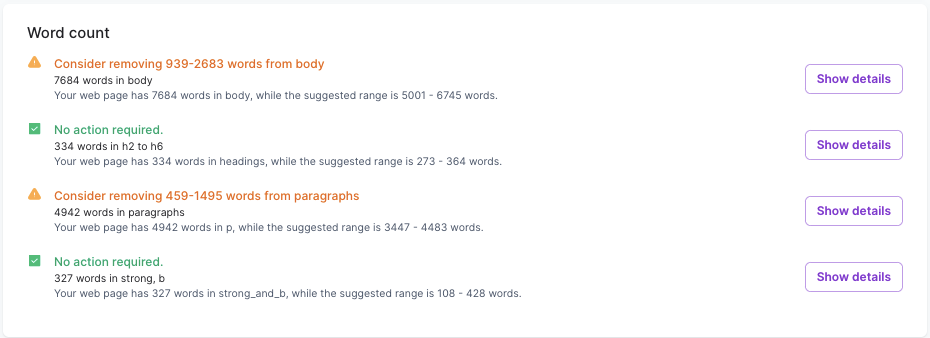
2. Screaming Frog
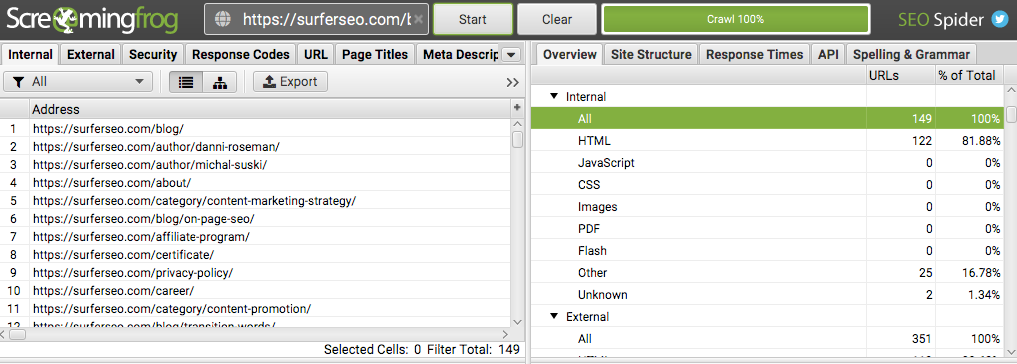
Screaming Frog is a go-to resource for SEO professionals seeking to automate routine aspects of search engine optimization.
The platform's SEO Spider tool is designed to crawl websites, automating the process of conducting technical audits.
It navigates through your site, identifying potential obstacles to optimal performance, such as broken links, duplicate content, incorrect indexing, and slow page load times, thereby automating the task of site analysis.
One of the standout features of Screaming Frog is its comprehensive reporting capabilities. These automated reports provide crucial insights into various SEO metrics, including page titles, meta descriptions, and response codes.
This information enables users to swiftly pinpoint and address any issues.
Furthermore, Screaming Frog allows for data exportation to Google Sheets.
This feature facilitates the accumulation of data from consecutive checks and the creation of reports in Google Data Studio. Consequently, users can automate the process of comparing reports over time and witnessing their progress in a tangible way.
3. SEMrush Keyword Magic tool
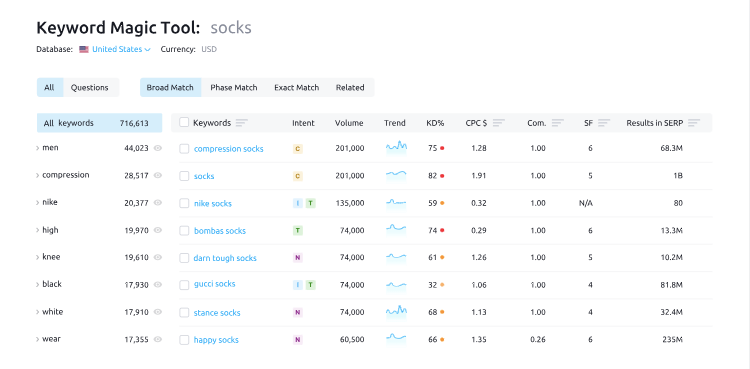
The SEMrush Keyword Magic tool is a powerful SEO automation tool that simplifies and streamlines the process of keyword discovery.
With a simple input of your seed keyword, this tool generates a wealth of crucial information.
It provides a comprehensive list of related short-tail and long-tail keywords, along with insights into their keyword difficulty, search volume, and the number of results they yield on the search engine results page (SERP).
This treasure trove of data is accessible with just a few clicks, offering valuable insights to shape your SEO strategy and make informed decisions about the keywords you choose to target.
The tool enhances the management of your SEO campaign by enabling the scaling of effective keyword research.
This automated approach significantly surpasses the manual method of identifying relevant keywords and assessing their value, which can be not only time-consuming but also less precise.
4. Ahrefs Content Explorer
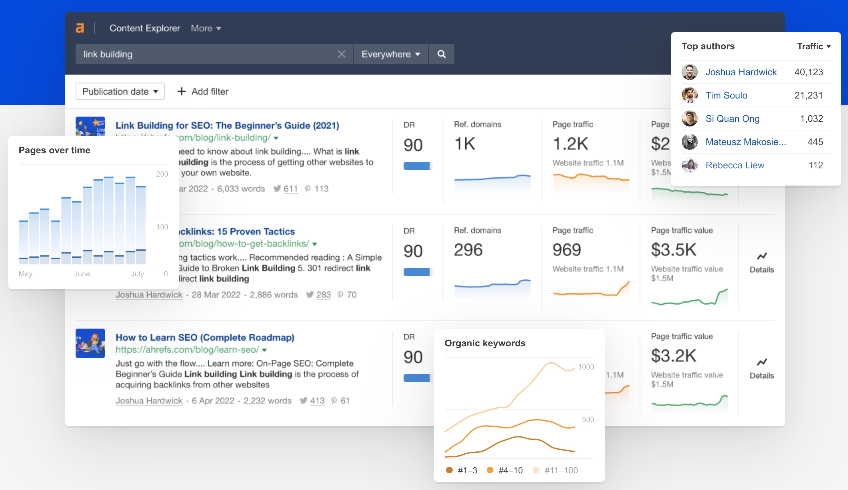
Ahrefs Content Explorer is a great tool to discover new content ideas, identify potential link prospects, and monitor competitors.
With an impressive database of 13.5 billion web pages, it offers a wealth of data that can be accessed with just a few clicks.
When you enter your keyword in the search bar, Ahrefs Content Explorer generates a detailed analysis of the web pages currently ranking for that keyword.
It offers insights into various metrics such as page traffic, domain rating, referring domains, and social shares.
The tool also allows you to filter by SEO and social metrics, language, word count, and more, enabling you to identify proven ideas for your next marketing campaign.
Additionally, it provides use cases like finding low-competition topics, guest blogging opportunities, and broken link building opportunities. Like Semrush, the Ahrefs suite has tools for social media insights too.
5. SEO PowerSuite
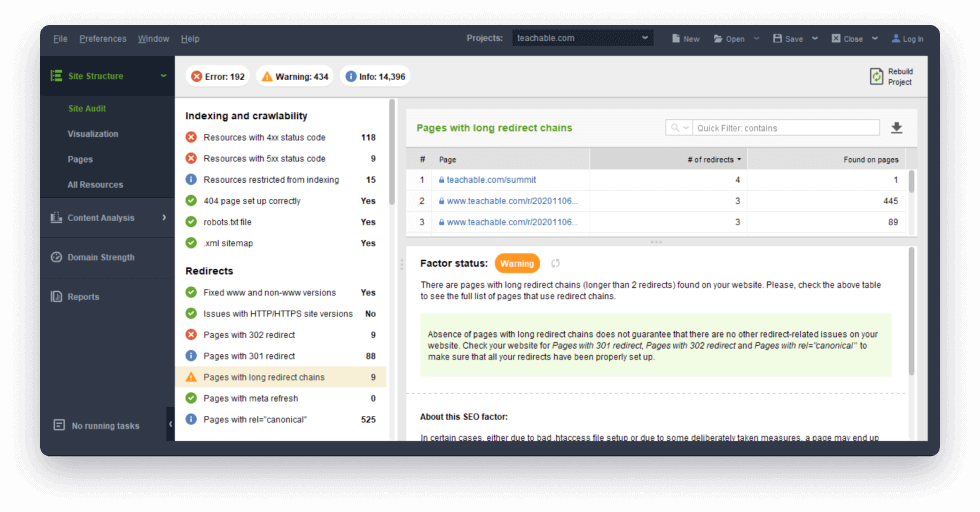
As an automation tool for SEO, one of SEO PowerSuite's key features is its site audit capabilities. The tool allows you to conduct an in-depth analysis of your website, identifying technical issues or optimization opportunities that could be impacting your search engine rankings.
This automated process saves time and ensures a thorough examination of your site.
During the audit, SEO PowerSuite meticulously scans your website for broken links, assesses page load speed, verifies the effectiveness of your meta tags, and detects any duplicate content.
Thus enabling you to take prompt corrective actions to rectify any identified issues.
Furthermore, SEO PowerSuite provides a comprehensive exploration and evaluation of your website's backlink profile offering insights into the quality, relevance, and authority of the websites linking to your page.
Should you discover any low-quality links, you can promptly remove them.
6. Little Warden

Little Warden is a highly effective SEO automation tool, specializing in automating technical SEO tasks. This tool empowers website owners and SEO professionals to maintain optimal website monitoring and optimization without the burden of manual checks.
Upon entering your site's details into Little Warden, it promptly begins a comprehensive scan to ensure all aspects of your site are functioning correctly. Key features that the tool monitors include:
- SSL certificate status
- Domain expiration
- Redirects and HTTP status codes
- Page changes
These are crucial areas that Little Warden meticulously monitors to ensure smooth operation.
By automating these tasks, it addresses minor issues that could otherwise go unnoticed until they cause significant negative impacts on your website's rankings and overall performance.
Upon completion of the scan, Little Warden generates detailed reports that highlight the positives, warnings, and potential risks for your website's technical SEO.
These reports offer a clear snapshot of your site's health and performance, pinpointing areas for improvement and providing actionable recommendations.
By automating these technical SEO tasks, Little Warden allows you to focus more on strategic planning and less on routine checks.
7. SERPWoo
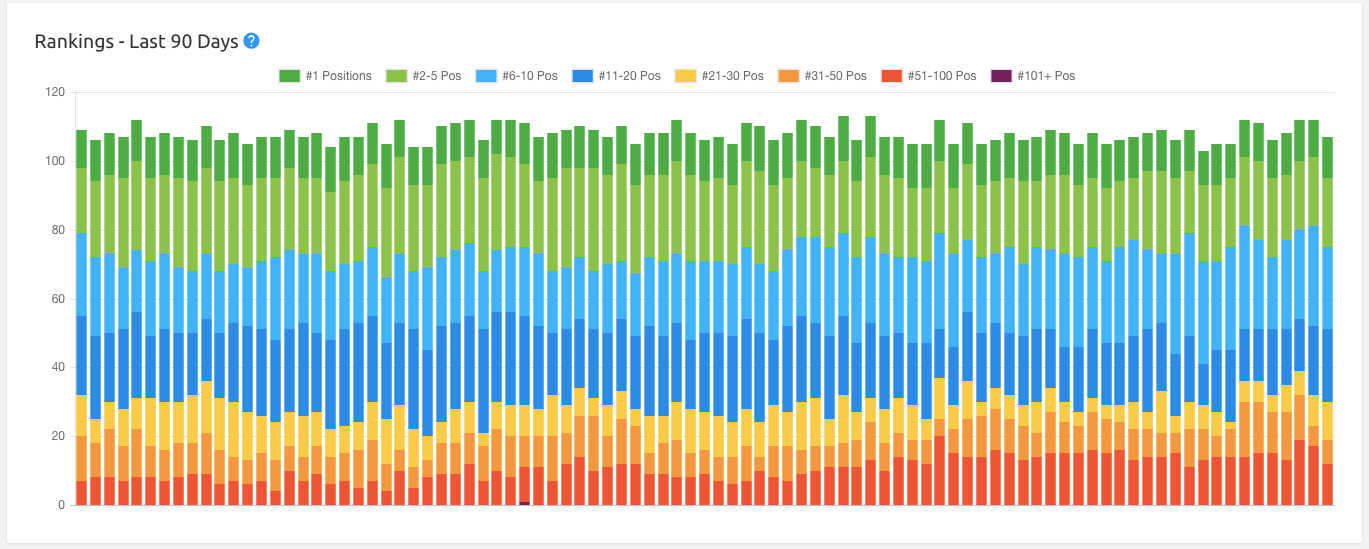
SERPWoo is a great SEO automation tool that excels at rank tracking, offering valuable insights into search engine performance to website owners and SEO professionals.
By automating the tracking of your Search Engine Results Page (SERP) rankings, SERPWoo enables you to evaluate the effectiveness of your optimization strategies and pinpoint areas that require enhancement.
This includes analyzing the impact of your keyword targeting, content optimization, and backlink-building strategies.
With this data, you can make informed adjustments to boost your rankings.
SERPWoo provides precise and current data, allowing you to monitor keyword positions and scrutinize trends over time. This automated process saves time and ensures a thorough examination of your site's performance.
One of the standout features of SERPWoo is its automated reporting.
You can set up these reports to receive regular updates on your rankings, keeping you abreast of any fluctuations or changes. This feature ensures you're always informed and able to react quickly to changes in your site's performance.
By automating these SEO tasks, SERPWoo not only saves you time and effort but also allows you to focus more on strategic planning and less on manual data analysis.
8. SE Ranking

SE Ranking is a robust SEO automation tool that excels in competitor analysis, providing users with valuable insights into their competitors' SEO strategies.
One of the key features of SE Ranking is its ability to track competitors' rankings for the same keywords you're targeting.
This automated rank tracking allows you to understand your competitors' performance and adjust your own strategies accordingly. Additionally, it provides insights into their backlink profiles, which can inform your own link-building efforts.
These insights enable businesses to refine their keyword targeting and identify areas where they can gain a competitive edge.
By automating these tasks, SE Ranking saves you time and ensures a thorough examination of your competitors' strategies.
Getting started with SE Ranking is straightforward.
Simply enter your competitor's URL into the designated search bar, and SE Ranking will generate a comprehensive list of data.
This data can be leveraged to enhance your own SEO strategies.
By automating these SEO tasks, SE Ranking not only saves you time and effort but also allows you to focus more on strategic planning and less on manual data analysis.
This makes it an invaluable tool for enhancing your SEO efforts and achieving better results in your digital marketing campaigns.
9. Plerdy
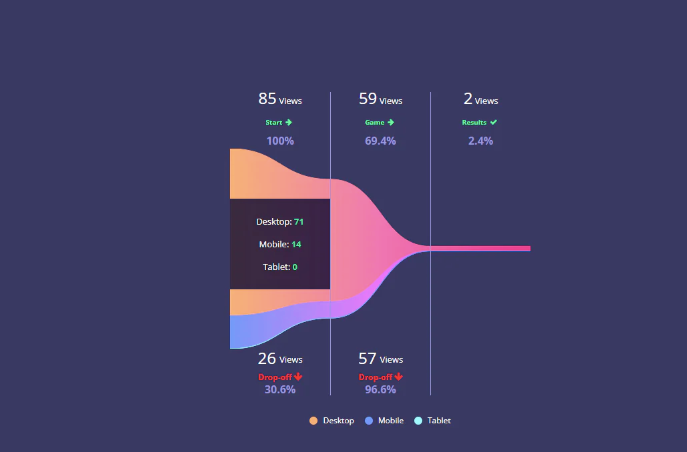
Plerdy is a remarkable SEO automation tool that specializes in conversion rate optimization, enhancing your website's performance and driving improved conversions.
One of its key features is the ability to gather direct insights from visitors using pop-ups.
This allows you to understand potential areas of improvement and make necessary adjustments to enhance user experience.
However, the standout features of Plerdy are its heatmap and session recording capabilities.
These tools automate the process of tracking visitor behavior on your site, including where they spend the most time and what factors might deter them from making a purchase from your website.
The heatmap feature provides a concise and informative overview of visitor engagement on your website, highlighting areas that attract the most attention.
For a more in-depth analysis, the session recordings delve into the user experience, illuminating the reasons behind specific issues you may be encountering.
By automating these tasks, Plerdy not only saves you time and effort but also allows you to focus more on strategic planning and less on manual data analysis.
10. Keyword Surfer [Free]
Keyword Surfer is a free Chrome extension that you can use when browsing the SERPs. The tool displays monthly search volume, cost per click and related keyword ideas to expand on your keyword research.

You also have the option of selecting your target country. As you scroll down the SERP, it also shows you the word count and domain level traffic for your competitors.
11. Ubersuggest
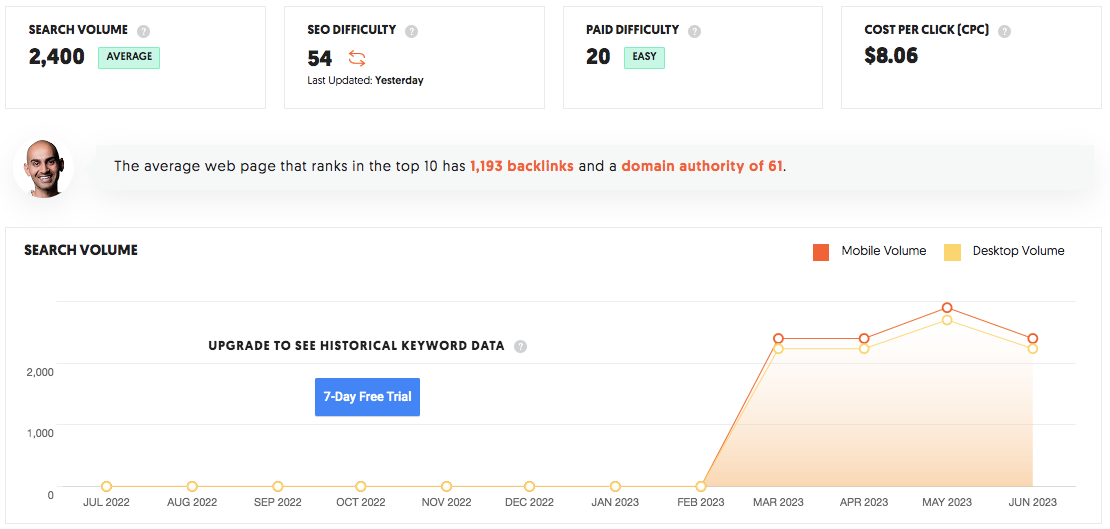
Ubersuggest is a popular SEO automation tool that can help handle repetitive SEO tasks in your workflow.
Think of it as a cheaper version of Ahrefs and Semrush, even offering a free plan.
One of its standout features is its keyword research capability. With a simple click, you can discover relevant keywords along with their associated metrics, saving you time and effort in manual research.
The competitor analysis tool allows you to delve into their websites and unearth valuable insights. You can explore their backlink profile, identify their top-ranking keywords, and gain a comprehensive understanding of their overall SEO strategy.
For those seeking an exhaustive website audit, Ubersuggest's audit tool is an excellent choice.
It identifies broken links that need rectification, analyzes page load time, and evaluates other on-page SEO factors. This thorough audit ensures no aspect of your site's performance is overlooked.
12. Google Search Console

Google Search Console is a powerful SEO automation tool that provides invaluable insights into your website's performance in Google's search results.
It's a free SEO tool offered by Google to help monitor, maintain, and troubleshoot your site's presence in Google Search results.
Google Search Console provides detailed reports on how your site is performing in search, including data on which queries are driving traffic to your site, which pages are most popular, and how your site appears in search results.
You can use GSC for a number of SEO metrics, from keyword rankings to backlink analysis.
By automatically gathering metrics on your website's performance in the SERPs, GSC can help you understand what's working in your SEO strategy and what might need improvement.
And can also save you the cost of a more expensive analytics tool.
Additionally, the tool allows you to submit sitemaps and individual URLs for crawling, ensuring that Google has the most up-to-date view of your site.
It also provides insights into your site's mobile usability, an increasingly important factor in SEO. As an SEO, GSC may be the only SEO automation software you need to track your content's performance.
13. ChatGPT

ChatGPT, developed by OpenAI, is a powerful tool that can be leveraged to automate various SEO tasks, enhancing efficiency and accuracy in your SEO strategy.
One of the key ways ChatGPT can assist with SEO is through content creation. It can generate high-quality short form content, including product descriptions and meta tags.
I would not trust ChatGPT with keyword research because the tool does not consider ranking factors or search volume. However, it is a good place to source seed keywords.
By inputting a few main topics, ChatGPT can generate a list of related keywords, helping you identify new opportunities to begin your keyword research process.
Think of ChatGPT as an AI researcher that can help you find important information and summarize content when you're writing SEO content.
Additionally, ChatGPT can be used to analyze SEO data and provide insights.
For example, it can process data from Google Analytics or other SEO tools and generate easy-to-understand reports, highlighting key performance indicators and areas for improvement.
Furthermore, ChatGPT can provide summaries of the latest SEO news and updates, ensuring you're always up-to-date with changes in the SEO landscape.
Where do SEO automation tools fail?
SEO automation tools fall short when it comes to personalized SEO activities that are specific to an industry or website. They also can't handle content management related tasks in your SEO process.
While SEO automation tools offer significant benefits in streamlining and simplifying various SEO tasks, it's important to acknowledge their limitations. Despite their effectiveness, there are 3 areas where these tools fall short.
Lack of human insight: SEO is not only about numbers and data; it requires human understanding and instinct.
Automation tools may not fully grasp the context or nuances of a specific industry or target audience.
Human expertise is still necessary to make informed decisions and tailor strategies accordingly.
Inaccurate information: Some automation tools might not be as accurate as others.
For example, Backlinko's study discovered that the SEMrush keyword difficulty scores are 110% higher than the average on other tools.
So it's always best to take the information presented as a general guideline rather than 100% accurate.
Broad suggestions: It's crucial to strike a balance and avoid relying too heavily on these tools without grasping the underlying concepts and strategies at play.
Blindly following every suggestion without considering the broader SEO landscape and the user experience can be risky and may result in lacklustre results.
Conclusion
Automation tools can lighten your load and help you navigate the intricate web of SEO. From keyword research to technical audits, they streamline tasks that would otherwise consume a lot of your time.
However, it's also important to remember they're not miracle workers.
They might not understand the intricacies of your industry or provide foolproof accuracy. So, while they're invaluable allies, don't blindly implement every suggestion.

